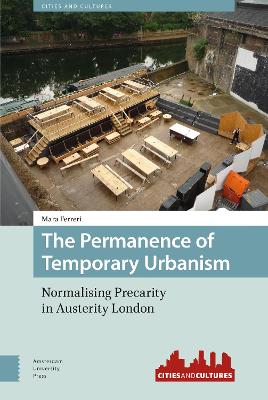Cities and Cultures
1 total work
Temporary urbanism has become a distinctive feature of urban life after the 2008 global financial crisis. This book offers a critical exploration of its emergence and establishment as a seductive discourse and as an entangled field of practice encompassing architecture, visual and performative arts, urban regeneration policies and planning. Drawing on seven years of semi-ethnographic research, it explores the politics of temporariness from a situated analysis of neighbourhood transformation, media representations and wider political and cultural shifts in austerity London. Through a longitudinal engagement with projects and practitioners, the book tests the power of aesthetic and cultural interventions and highlights tensions between the promise of vacant space re-appropriation and its commodification. Against the normalisation of ephemerality, it presents a critique of the permanence of temporary urbanism as a glamorisation of the anticipatory politics of precarity which are transforming cities, subjectivities and imaginaries of urban action.
